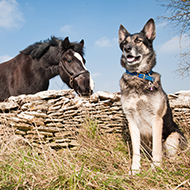
Blue Cross issues advice to people taking their dog away for the first time.
Dog owners are being urged to plan ahead for ‘staycations’ this summer, as new figures show more than half intend to take their pet on a UK getaway this year.
With more than a quarter of people taking on a pet during the pandemic, national charity Blue Cross is offering advice to owners that may be taking their dog away from home for the first time.
The charity fears that many dogs may not have seen the sea before or had much experience around livestock.
“There are a few key things to consider before you go, during the journey and when you arrive,” said Kerry Taylor, Blue Cross education manager. “For example, find out where the nearest vet is located and check our first aid advice, just in case.
“Make sure your dog is microchipped, which they should be by law, and your mobile phone number is on their dog tag. Pack everything your dog will need and to make sure they are comfortable being in a strange place, especially if it’s their first time.”
A survey of around 1,000 dog owners conducted by Blue Cross in May reveals that 51 per cent plan to take their pet on holiday this year.
Of these, two-thirds of respondents admitted feeling nervous about taking their dog away – with 40 per cent saying they fear their dog might get stolen or go missing. Despite this, more than a third confessed they didn’t have a contact number on their dog’s tag.
The survey also reveals that a third of owners worry their pet will overheat in the sun. However, a quarter of owners believe it is acceptable to leave a dog in the car with the windows open when making a quick stop.
“New dog owners, in particular, need to plan ahead and do some research before setting off,” said Kerry. “Never leave your dog alone in a car, on hot days, even just for a couple of minutes, as it can be extremely dangerous and even deadly.”



 The Veterinary Medicines Directorate (VMD) is inviting applications from veterinary students to attend a one-week extramural studies (EMS) placement in July 2026.
The Veterinary Medicines Directorate (VMD) is inviting applications from veterinary students to attend a one-week extramural studies (EMS) placement in July 2026.